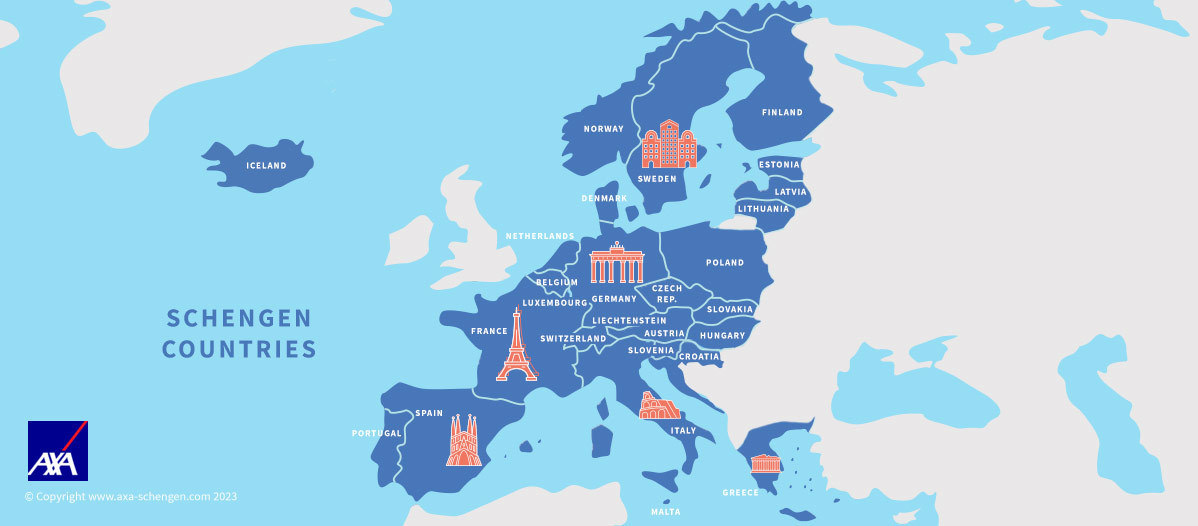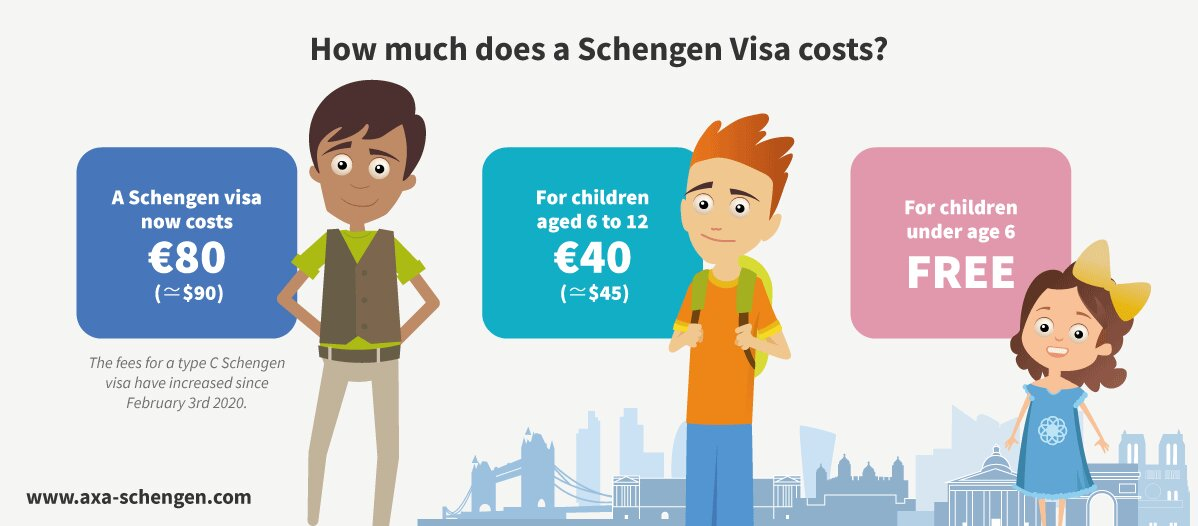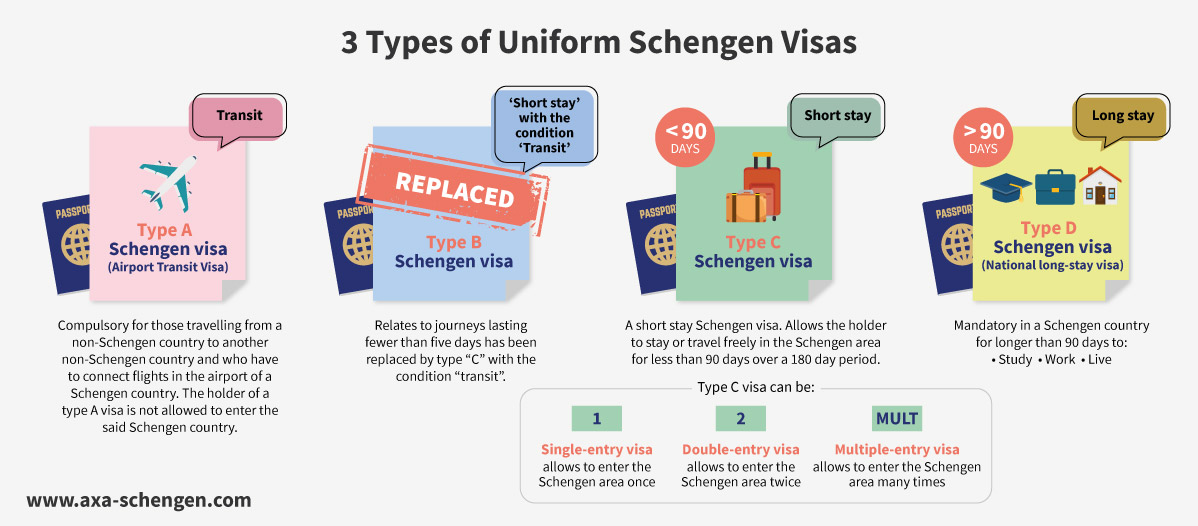
AXA Schengen: Travel Insurance Covering the Schengen Area Completely
Leading supplier of travel insurance tailored especially for individuals visiting the Schengen Area is AXA Schengen. Comprising 27 European nations without internal borders, the Schengen Area permits passport-free travel across the continent. Getting a Schengen Visa means that visitors must have current travel insurance that satisfies particular criteria; AXA Schengen provides customised plans that fit these criteria. Travellers looking for peace of mind throughout their European experiences know AXA Schengen to be a reliable, all-encompassing, and first-rate customer service alternative.
AXA Schengen insurance stands out mostly for its thorough coverage. The preparations are meant to cover a broad spectrum of possible hazards and crises that visitors might come across. Medical costs, emergency medical evacuation, repatriation, travel cancellation or interruption, and lost or stolen bags all fall under this. Given the high cost of healthcare in Europe, the medical coverage is especially important since it guarantees that visitors may get the required treatment free from major out-of-pocket costs by means of appropriate insurance. Policies of AXA Schengen provide strong protection and cover medical expenses up to at least €30,000, therefore fulfilling the Schengen Visa criteria.
Different insurance options provided by AXA Schengen help to meet different travel budgets and needs. For those on a tight budget, the “Low Cost” plan offers necessary coverage at reasonable rates. More thorough coverage is provided by the “Europe Travel” plan, which also includes other advantages such travel interruption and baggage loss and more limited medical expenses. The “Multi-Trip” plan is best for individuals looking for the maximum degree of security since it offers complete benefits and covers several journeys inside a year. This adaptability lets passengers pick a schedule fit for their particular requirements and way of travel.
Apart from covering all the ground, AXA Schengen stresses simplicity and convenience. One can get the insurance online by means of a simple and intuitive approach. Within minutes, travellers may get an estimate, choose their preferred plan, and finish the purchase. Right now available for download is the insurance certificate needed for the Schengen Visa application. This effectiveness guarantees that visitors may fast acquire the required coverage and go with their visa application without delays. Policyholders may also manage their insurance, obtain pertinent documentation, and contact customer assistance as needed on the web portal.
At AXA Schengen, a basic value is customer service. From the time they buy their insurance until the end of their travels, the organisation is dedicated to provide outstanding assistance to its clients so they may have a good experience. Customer care staff of AXA Schengen is on call around-the-clock to help with any questions or crises that might develop. The committed staff is always ready to assist with information on the policy, claim assistance, or support during a medical emergency. AXA Schengen has developed a reputation for dependability and credibility by its dedication to customer satisfaction.
Travel insurance from AXA Schengen also offers useful extras meant to improve the trip. Policyholders can access a variety of help services including legal counsel, travel guidance, and support should documents be lost or stolen. These services guarantee travellers have the support they need all along their trip and offer an additional degree of protection and convenience to help them negotiate unforeseen events. Further improving the protection given to passengers is the insurance covering journey delays, missing connections, and emergency travel plans.
Important facets of AXA Schengen’s activities include sustainability and business responsibility. The business is dedicated to environmentally friendly methods and helping to improve the surroundings and local welfare. Reducing its carbon impact, promoting renewable energy projects, and motivating responsible travel among its clients are just a few of the several sustainability programmes AXA Schengen undertakes. Travellers who choose AXA Schengen not only get thorough and dependable insurance but also support a business that supports sustainability actively.
All told, AXA Schengen is a top supplier of travel insurance specifically for the Schengen Area. AXA Schengen guarantees that visitors have the security and peace of mind they require for their European experiences with thorough coverage, flexible plans, easy online services, and first-rate customer assistance. AXA Schengen provides the dependable and strong insurance coverage needed for a flawless and fun vacation whether your travel is for leisure, business, or to see family and friends. Get your AXA Schengen insurance right now to confidently start your trip.

Understanding the Schengen Visa
Travellers with a Schengen Visa can roam unhindered across the 27 European nations comprising the Schengen Area. Usually valid for up to 90 days within a 180-day period, this visa is a short-stay visa suited for visitors, business travellers, or those seeing friends and relatives. Approved in 1995, the Schengen Agreement eliminated internal borders between members, therefore enabling passport-free travel over the region. One of the main causes of the great demand for the Schengen Visa among foreign visitors is this flawless travel experience.
Applying for a Schengen Visa entails sending a thorough application to the consulate or embassy of the Schengen nation you intend to spend most time in. Should the travel time be equal across several nations, the application should be made to the first country of arrival. Providing personal information, trip details, financial documentation, and travel insurance forms part of the application procedure. Designed to satisfy visa criteria, AXA Schengen provides customised travel insurance coverage covering medical emergencies, trip cancellals, and other unanticipated situations.
The Schengen Visa is flexible and covers several travel uses. The Schengen Visa fits your demands whether your stay is for business, medical, travel, or attendance of conferences and cultural events. Depending on the kind of visa issued, it also permits several entries, which is advantageous for those who must make regular Schengen Area travels. For business visitors and individuals with familial links across several Schengen nations, this adaptability is quite helpful.
The Schengen Visa’s main advantage is its capacity to let one travel across 27 European nations without separate visas. In addition to streamlining travel logistics, this saves money and time. Within the Schengen Area, visitors can discover a wide spectrum of civilizations, landscapes, and historical monuments, therefore improving their trip. The Schengen Visa gives you the ability to visit the mediaeval castles of Germany, the Eiffel Tower in France, the canals of Venice in Italy, or any other site with simple freedom.
The consistency of the visa application among Schengen nations is another major advantage. The consistent application process guarantees that, once you get the visa, it is valid for all members of the union, therefore simplifying the travel preparation process. This uniformity also implies that, independent of the country of application, the necessary procedures and documentation are comparable, therefore facilitating the preparation of applications. For those who can create an itinerary including several countries without extra documentation, it is quite a benefit.
Additionally providing financial advantages for visitors is the Schengen Visa. One visa allows guests to explore several locations using low-cost planes and regional train services, therefore utilising inexpensive travel choices. For visitors trying to maximise their European vacation without going broke, this reasonably priced travel approach is perfect. Furthermore, the single visa cost saves travellers a lot of money compared to several costs paid for different countries.

Prerequisites for a Schengen Visa
Candidates for a Schengen Visa have to satisfy several criteria and provide particular paperwork. Accurately and sincerely finishing the visa application form comes first. Apart from the form, candidates have to provide a valid passport with at least two blank pages and validity spanning at least three months beyond the planned Schengen Area departure. Furthermore required are passport-sized pictures fulfilling the visa criteria.
The application depends much on financial evidence, which shows the visitor has enough money for their stay in the Schengen Area. This can call for wage stubs, bank statements, or sponsorship letters. Proof of accommodation—that instance, hotel bookings or an invitation letter from a host—also counts. Travellers also have to present a thorough travel schedule including their intended activities and Schengen Area destinations.
Applicators for the Schengen Visa must have travel insurance covering medical emergency, hospital treatment, and repatriation. Travel insurance plans especially meant to satisfy these criteria are provided by AXA Schengen, guaranteeing complete coverage during the journey. The insurance policy ought to be valid across all Schengen nations and cover costs up at least €30,000. At last, depending on the reason of the visit, other records including an employment letter, business invitation, or evidence of attendance in a cultural event could be required.
Finding the nation of application—usually the one the visitor would spend most time or initial country of arrival—opens the application procedure for a Schengen Visa. After decided upon, candidates must compile the necessary paperwork and finish the visa application form. Appointments with the consulate or embassy should be booked well in advance since, particularly in busy travel times, they can fill up fast.
Applicants must pay the visa fee and turn in their application form together with all supporting documentation during the visa appointment. They would also have to furnish biometric information comprising a picture and fingerprints. Certain candidates could have to show up for an interview where they will be questioned about their goals for visiting the Schengen Area, financial position, and travel schedule. A strong application depends on your being honest and clear throughout this interview.
Following an appointment, a Schengen Visa’s processing period might vary usually between 15 and 30 days. To allow for potential delays, applicants should apply well ahead of their intended travel dates. Approved the visa will be attached to the applicant’s passport, noting the terms and length of stay. Should a visa be denied, applicants are entitled to appeal the ruling using the particular policies set forth by the consulate or embassy.
Advice on a Strong Schengen Visa Application and Schengen Visa Fees: Understanding the Costs
The cost of obtaining a Schengen Visa can vary depending on several factors, including the applicant’s age, nationality, and the type of visa being applied for. Below is a detailed breakdown of the standard Schengen Visa fees as of 2024:
Standard Schengen Visa Fee
The standard fee for a Schengen Visa application is €80. This fee applies to most adult applicants and covers the processing costs for the visa application. The fee is non-refundable, even if the visa application is denied.
Reduced Fees for Children
Children between the ages of 6 and 12 years old benefit from a reduced visa fee of €40. This reduced rate is designed to make family travel more affordable and accessible. Children under the age of 6 are exempt from the visa fee altogether, making it easier for families with young children to travel to the Schengen Area.
Applying for a Schengen Visa needs both meticulous attention to detail and diligent planning. Start by fully knowing the criteria and compiling the required records. Verify again whether your passport has enough vacant pages and satisfies the validity criteria. Make sure every form is completed consistently and precisely since differences could cause denials or delays. Your application will be stronger if you include confirmed lodging bookings together with a thorough and well-defined trip schedule.
The application depends critically on financial evidence. Make sure you send current wage stubs, bank statements, or sponsorship letters proving your financial consistency. It’s crucial to demonstrate that you can help yourself all during your stay in the Schengen Area without depending on illicit employment or other methods. Furthermore, getting thorough travel insurance from a reputable company like AXA Schengen not only satisfies visa requirements but also gives you piece of mind while on travel.
Present yourself boldly and honestly answer questions during the visa application and interview. Be ready to discuss your trip schedule, visit’s goal, and ties to your native tongue. Strong ties—family, work, property, or anything else—can reassure the consulate or embassy of your will to go back following your trip. To prevent last-minute worry, save copies of all turned in paperwork and be informed of visa processing times.
Travelling inside the Schengen Area becomes a simple experience once you have your Schengen Visa. Like domestic travel, the visa lets you move between member nations without further border restrictions. Still, you should always carry your passport and visa since you could have to show them during random inspections inside Schengen or across borders. To guarantee a seamless and fun travel, learn the local laws and customs of any nation you intend to visit.
Schengen Visa holders can benefit from a range of local transit choices including low-cost planes, high-speed trains and effective public transport networks. This makes it simple to visit several locations and savour the several European cultures, scenery, and foods. The Schengen Visa gives the freedom to maximise your European trip whether your interests are in historic cities, appreciating the breathtaking countryside, or lounging on lovely beaches.
Furthermore crucial is observance of the visa terms, including validity time and maximum stay duration. Ignoring your visa may cost fines, penalties, and maybe future travel prohibitions. Contact the local immigration officials in the nation you are staying in well before your visa runs out if you must stay for whatever reason. Following visa rules guarantees that your travel stays hassle-free and fun.

Schengen Visas: Recognising Your Alternatives
Knowing the several kinds of Schengen visas that are issued is crucial while making travel plans to the Schengen Area These visas guarantee that every visitor’s particular needs are satisfied since they allow different travel intents and lengths. The various varieties of Schengen visas are discussed below to assist you choose which one fits your trip the most.
Type A Schengen Visa, Airport Transit Visa
Travellers from non-Schengen nations who must pass through an airport of a Schengen nation on their way to a non-Schengen destination must apply for the Type A Schengen Visa, Airport Transit Visa. Those who must link planes at a Schengen airport but do not want to visit the Schengen Area must apply this visa. A Type A visa holder cannot leave the airport or enter the Schengen nation, but is permitted to remain in the international transit area of the airport.
Schengen Visa Type C—Short-Stay Visa
Most often issued visas, the Type C Schengen Visa lets visitors spend limited stays in the Schengen Area. For up to 90 days during a 180-day period, this visa lets the holder stay or move freely inside the Schengen Area. Travel, business, family visits, or other temporary needs call for the Type C visa. Travellers with varying demands and travel schedules will find this visa to be flexible whether it is single-entry, double-entry, or multiple-entry visa.
One single-entry visa lets the holder enter the Schengen Area once. Independent of the remaining days, the visa expires whenever the visitor leaves the Schengen Area.
Double-entry visas let their holders enter the Schengen Area two times within the duration of the visa. Travellers who must leave and re-enter the Schengen Area within a limited time will find it handy.
Travellers holding a multiple-entry visa may enter and leave the Schengen Area several times over the validity term. Business visitors, frequent visitors, or those with family in the Schengen Area will find it perfect. Depending on the applicant’s travel past and the judgement of the granting consulate or embassy, multiple-entry visas can be granted for one year, three years, or five years.
Type D Schengen Visa—National Long-Stay Visa
Usually for business, research, or other long-term use, the Type D Schengen Visa—also known as the National Visa—is meant for those who intend to stay in a particular Schengen nation for a considerable duration. Usually awarded either single-entry or multiple-entry, this visa reflects the applicant’s circumstances. In some situations, national visas let holders travel inside the Schengen Area and live in the issuing nation for more than ninety days. Students, professionals, or anybody engaged in exchange programmes who must spend a significant amount of time in a Schengen nation should consider this visa.
Low Territorial Validity Visa (LTV)
The Limited Territorial Validity Visa lets the holder travel solely inside the particular Schengen nations that issued it. Usually provided in extraordinary circumstances, this kind of visa is for humanitarian, national, or international commitments. It is not valid for admission into any other Schengen nation not specified on the visa. Less often issued and usually granted under specific conditions is this kind of visa.
Visa Fee Reductions and Wavers
Depending on their particular situation, certain candidates are qualified for lowered fees or fee exemptions. Students, researchers travelling for scientific research, and representatives of non-profit organisations aged 25 or under participating in seminars, conferences, sports, cultural, or educational events organised by non-profit organisations are exempt from visa fees, for instance, pupils, accompanying teachers on school trips. Reduced visa fees resulting from bilateral agreements between their nation and the European Union could potentially help nationals of particular nations.






